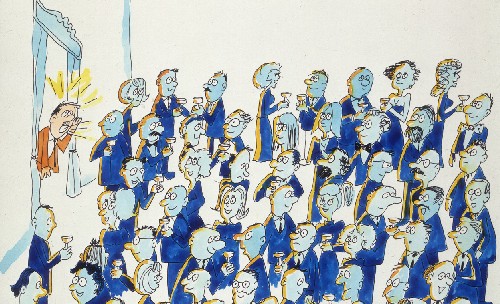
Physicists chatter excitedly at CERN (Drawing: Georges Boixader)
By James Dacey
A couple of weeks ago, I went to CERN to witness the big moment when the first collisions of 7 TeV occurred within the Large Hadron Collider. The event smashed yet another world record and marked the beginning of the LHC’s physics programme, 18 months after the colossal machine was initially switched on.
Amidst the excitement, I carried out a series of quick-fire interviews with scientists at the four experiments to find out their hopes and aspirations for the coming months.
Not surprisingly, there was a lot of speculation at ATLAS and CMS, the two largest detector experiments, about the hunt for the Higgs boson – the particle predicted by the Standard Model to give mass to substance in the universe.
Reactions were equally excited at the LHCb and ALICE experiments where physicists were talking freely about some quite frankly mind-boggling questions that they are about to tackle. These will include: how the universe evolved in its first ten-millionths of a second; and why are we not surrounded by antimatter suns and antimatter galaxies.
In addition to the science, I also found out what it’s like to work at CERN: the conditions; how scientists deal with the competition between collaborations; and the benefits of working in a truly international project.
You can read highlights from these interviews in this newly published feature article.



